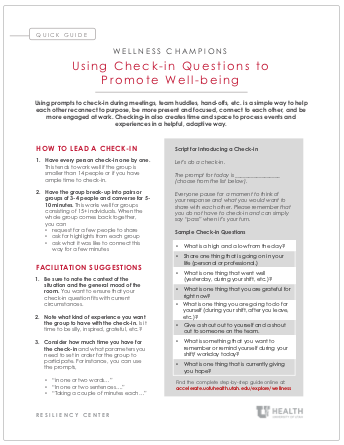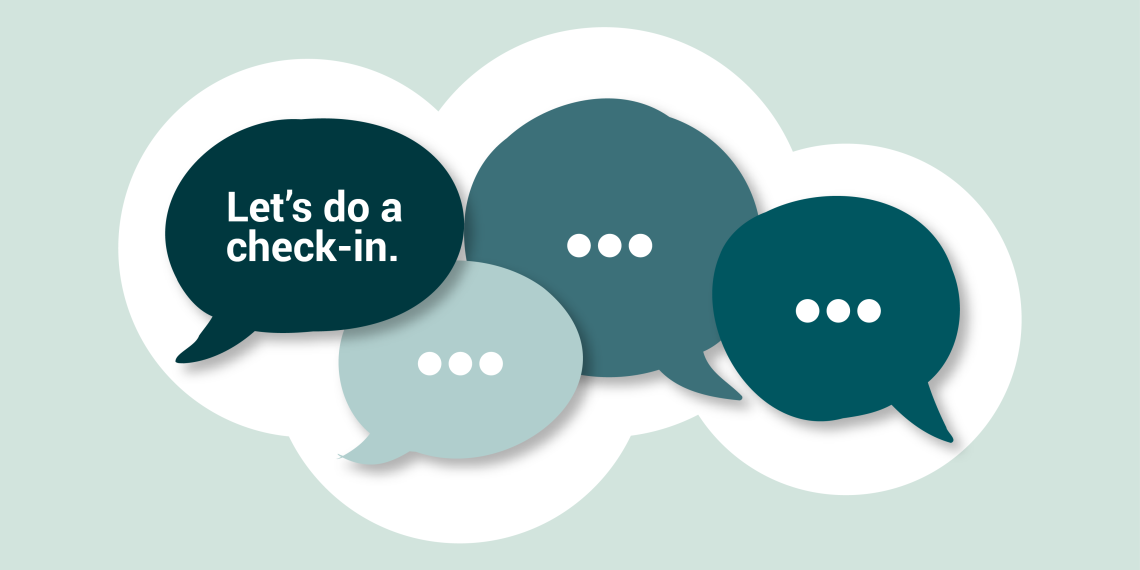
Download the 1-page Check-in Quick Guide here.
sing prompts to check-in during meetings, team huddles, hand-offs, etc. is a simple way to help each other reconnect to purpose, be more present and focused, connect to each other, and be more engaged at work. Checking-in also creates time and space to process events and experiences in a helpful, adaptive way.
How to lead a check-in
There is no one way to do a check-in. Here is a simple format that works for most circumstances.
Have every person check-in one by one. This tends to work well if the group is smaller than 14 people or if you have ample time to check-in.
Have the group break-up into pairs or groups of 3-4 people and converse for 5-10 minutes. This works well for groups consisting of 15+ individuals. When the whole group comes back together, you can
- request for a few people to share
- ask for highlights from each group
- ask what it was like to connect this way for a few minutes
Script for introducing a check-in
|
Let’s do a check-in. The prompt for today is _________________ (choose from the list below). Everyone pause for a moment to think of your response and what you would want to share with each other. Please remember that you do not have to check-in and can simply say “pass” when it’s your turn. |
Sample check-in questions (prompts)
|
Download a print copy of this script, questions and step-by-step guide.
Facilitation suggestions
Be sure to note the context of the situation and the general mood of the room. You want to ensure that your check-in question fits with current circumstances.
Note what kind of experience you want the group to have with the check-in. Is it time to be silly, inspired, grateful, etc.?
Consider how much time you have for the check-in and what parameters you need to set in order for the group to participate. For instance, you can use the prompts,
- “in one or two words…”
- “In one or two sentences….”
- “Taking a couple of minutes each…”
4 Tips from the experts
Tip 1: Use supportive prompts. As the check-in facilitator, you can use emotion coaching to respond to each participant (e.g., “Sounds like that was really meaningful.”). A simple “thank you for sharing” can also go a long way.
Tip 2: Order keeps it organized. It is usually more efficient to go around the room in a certain direction or call on people to share than wait for people to chime in.
Tip 3: Keep it relevant. Remind people to share stories that are appropriate for work and their work colleagues.
Tip 4: Keep it professional. Politely interrupt people who are oversharing or getting too personal. Follow-up with them individually.
References:
- Psychological First Aid For Your Team | (Accelerate 2020) The Resiliency Center’s Megan Call and Amy Locke share helpful resources and list of prompts to connect your team.
- The Effective Communicator: Add Meaning To Your Meetings | (Accelerate 2019) Is a more meaningful meeting possible? Isaac Holyoak teams up with Megan Call of the Resiliency Center to help you start your meetings right.
- Check-In and Check-Out Questions (Hyper Island Toolbox) Step-by-step beginner facilitation guide for groups 2-40+.
*Originally published October 2020
Megan Call
Trinh Mai
Megan Jean Whitlock
Emotion coaching is a skill that can help validate a person’s experience—but it takes practice. Follow this step-by-step guide to learn how to use this important skill with patients, co-workers, family members and friends.
Hospitalist Ryan Murphy reflects on the care his dad received as one of Utah’s first hospitalized COVID-19 patients. The experience shaped how he communicates with patients—whether or not they have COVID—in spite of isolation, masks, and physical distancing.
Taking time throughout the day to move is a great way to add physical activity to your routine and carve out space to reflect and recover. Wellness programs manager Britta Trepp, College of Health Graduate student Karly Ackley and physical therapist Tasha Olsen walk us through the motions.
